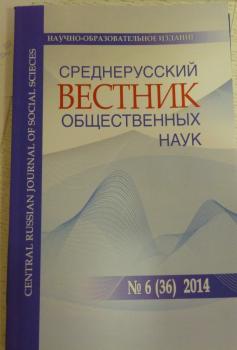The trust to the municipal authority is considered as an indicator of its social efficiency and the premise of the inclusion of local community in the development and implementation of municipal policy. The basis of public trust to the municipal government is the confidence in the real efficiency of institutionalized protection practices of individual and collective rights, the promotion of legitimate interests of citizens. The factor of the economic situation and material welfare of citizens is also of significant importance. Based on the results of the regional sociological study, the low level of trust to municipal government is stated. Dynamics of trust is associated with the stages of the economic cycle. It is determined that trust to the local authority, expressed as institutionalized practices of public participation, promotion of individual and collective interests, can serve as a basis for the integration of the local community and the growth of social capital of its participants. According to the results of empirical research, a positive relationship is fixed between the level of trust to the municipal authorities and the participation in such forms of social activity, as collective landscaping, fund raising and organization of holidays. The lower the level of trust, the higher the proportion of respondents who participates in the signature collection, campaigns, collective appeal to the authorities and other official institutions.
local community, social space, social integration, municipal authority, trust to authority
1. Almond G., Verba S. Grazhdanskaya kul´tura: politicheskie ustanovki i demokratiya v pyati stranakh / Per. s angl. E. Gendelya. - M.: Mysl´, 2014. - 500 s.
2. Gubina N.V., Misbakhova Ch.A. Doverie naseleniya kak sotsiologicheskiy indikator effektivnosti munitsipal´nogo upravleniya. Vestnik Kazanskogo tekhnologicheskogo universiteta. - 2011. - № 20. - S. 270-274.
3. Kleman K. Doverie sotsial´noe i institutsional´noe. Sotsial´nye seti doveriya: massovye dvizheniya i instituty politicheskogo predstavitel´stva v sovremennoy Rossii: opyt starykh i novykh demokratiy v usloviyakh globalizatsii: Nauchnyy doklad. - M.: Institut sotsiologii RAN, 2007. - S. 91. Institut sotsiologii Rossiyskoy akademii nauk. - URL: http://www.isras.ru/files/File/Doclad/Networks_2007.pdf (data obrashcheniya: 09.10.2016).
4. Kozyreva P. M. Doverie i ego resursy v sovremennoy Rossii. - M.: Institut sotsiologii RAN, 2011.
5. Reutov E.V., Kolpina L.V., Reutova M.N., Boyarinova I.V. Sotsial´nye seti v regional´nom soobshchestve. - Belgorod: KONSTANTA, 2011. - 240 s.
6. Reutov E.V., Kolpina L.V., Reutova M.N., Boyarinova I.V. «Kul´tura nedoveriya» v regional´nom sotsiume: monografiya. - Belgorod: ID «Belgorod» NIU «BelGU», 2013. - 176 s.
7. Reutov E.V., Reutova M.N., Shavyrina I.V. Potentsial grazhdanskogo uchastiya v formirovanii regional´nogo solidarnogo obshchestva: Monografiya. - Belgorod: OOO «EPITsENTR» , 2015. - 120 s.
8. Slatinov V.B., Merkulova K.G. Sovremennyy etap munitsipal´noy reformy: soderzhanie i ozhidaemye effekty. Srednerusskiy vestnik obshchestvennykh nauk. - 2015.- № 3. - S. 37-45.
9. Shtompka P. Doverie - osnova obshchestva / Per. s pol. N.V. Morozovoy. -M.:Logos, 2012.- 448s.
10. Putnam R.D. Making Democracy Work: Civic Traditions in Modern Italy. Princeton, NJ: Princeton University Press, 1993.
11. Rothstein B., Uslaner E.M. All for all: Equality, corruption, and social trust. World politics. 2005. 58(1). Pp. 41-72.





